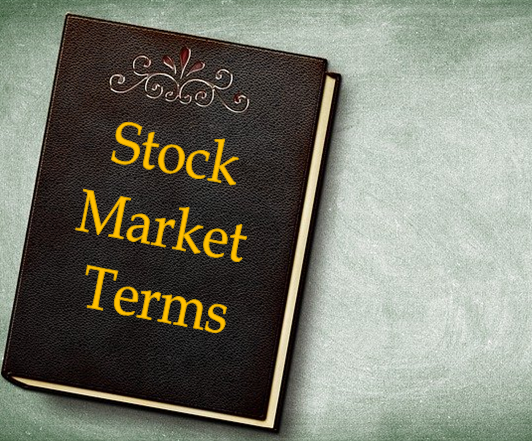
TRADER’S TRIO SPECIAL
(BETTER THAN A BAKER’S DOZEN!)
BUY THREE MONTHS OF WEEKLY OPTIONS TRADING MEMBERSHIP FOR $357 AND GET A FOURTH MONTH FREE!
Search this site:
STOCK MARKET TERMS
This list of stock market terms provides definitions of terms used in options trading, stock market trading and terms relating to the stock market and types of market conditions. Understanding these terms is a great advantage when trading weekly options, which is the primary focus of this site.

STOCK MARKET TERMS RELATING TO OPTIONS TRADING
The stock market terms listed in this section relate to understanding different types of options, aspects of the options trading process, and conditions affecting options contracts.
Abandon
To abandon an option means allowing it to expire without either exercising or
selling the option contract. This is frequently a decision made by a trader
when the option is expiring out-of-the-money.
At-the-Money
An option is at-the-money if the strike price of the option is equal to the
market price of the underlying security. For example, if a company's stock is
trading at $68, then the company's $68 option is at-the-money.
Call
A call option is an option contract than increases in value in relation to an
increase in value of the underlying security on which it is based.
Exercise
To exercise an option means to act on the right granted by the purchase of an
option contract to either buy (in the case of a call option), or sell (in the
case of a put option) the underlying security.
Expiration
Expiration date in the date on which a specific option contract becomes void.
In-the-Money
An option is described as being in-the-money when the exercise of the contract would result in a profit. This condition occurs when the strike price of a call option is lower than the market price of the underlying security, or when the strike price of a put option is higher than the market price of the underlying security.
Open Interest
The term open interest refers to the
number of outstanding option contracts at a given time for a specific class or
series of options.
Option Contract
An option contract gives the holder of the option the right (but not the obligation) to purchase, and obligates the writer to sell a specific number of shares of the underlying asset at the listed strike price on or before the expiration date of the contract.
Out-of-the-Money
An option is described as out-of-the-money when the exercise of the contract would result in a loss. This condition occurs when the strike price of a call option is higher than the market price of the underlying security, or when the strike price of a put option is lower than the market price of the underlying security.
Put
A put option is an option contract than increases in value in relation to a
decrease in value of the underlying security on which it is based.
Strike Price
The strike price is the predetermined price at which the options contract may
be exercised. This means that the underlying asset may be bought or sold at the
strike price according to the type of options contract.
Time Value
Time value refers to the value of the amount of time remaining prior to
expiration. This time value is one of the factors involved in the calculation
of an option’s premium.
Underlying
An underlying in stock market terms means the stock or other security upon
which the corresponding option is based.
STOCK MARKET TERMS RELATING TO TRADING in GENERAL
These stock market terms relate to the practical aspects of trading options or other securities on the stock market. The terms refer to buying, selling, placing orders, trading accounts and different types of trading.
After-hours Trading
After-hours trading refers to buying and selling securities during times
outside of market hours. After hours trades are executed using computer systems
known as ECNs (electronic communication networks). These ECNs match buyers and
sellers in order to facilitate after-hours trading.
Ask (Asked Price)
In trading terms, “Ask,” or “Asked Price” refers to the lowest price at which the
holder will sell a security.
Bid
The “Bid,” means the highest price that buyers have indicated they are prepared
to pay for a security.
Buying Power
Buying power is a term used to refer to a margin account. This indicates the highest
dollar value of marginable securities that the client can purchase or sell
short without being required to deposit additional funds.
Close
The ”Close” refers to the price of the final transaction of a security on a
trading day.
Day Order
A day order is an order that is open for the duration of the trading day on
which it was placed. A day order then expires at the close of trading on the
same day if it has not been completed.
Day Trade
A day trade involves buying and then subsequently selling the same security
within the same trading day.
Execution
Execution means the completion of the trade of a security.
Fill or Kill (FOK)
The term “Fill or Kill” refers to a type of order. Placing this order requires
the immediate execution of the entire order quantity at the specified price. If
this execution is not possible, then the order is cancelled or “killed”
automatically.
Fundamental Analysis
Fundamental analysis is used to evaluate the intrinsic value of a company and
its listed securities. One goal of fundamental analysis is to identify stock
which is undervalued, and therefore may present a worthwhile buying
opportunity. Fundamental analysis examines a company’s financial and
operational data, with particular attention to sales and earnings, management
and growth potential.
Good 'Til-Canceled (GTC)
A “Good ‘Til Canceled” order is an order that will not automatically be
canceled. Once placed, the order will remain open until it is executed or unless
it is canceled by the trading account holder.
Immediate-or-Cancel (IOC)
An “Immediate-or-Cancel” order is used when a trader requires immediate
execution of a trade at a specific price. This order ensures that as much of
the order as possible will be filled immediately at the stated price, and that
any unfilled portion of the order will then be canceled.
Limit Order
A limit order specifies the highest price that a buyer is willing to pay, or alternatively,
the lowest price that a seller is willing to accept. If the security becomes
available at the price stated on the limit order, or better, it will be
executed.
Margin Account
A margin account is an account that provides additional leverage to the account
holder. The brokerage firm allows the holder to use borrowed funds to purchase
eligible securities. Securities held by the account holder are used as
collateral, and therefore, if those securities decline in value, the account
holder will be required to either deposit additional funds, or to sell a
portion of the securities to maintain the stipulated balance.
Market Order
A market order is an order which specifies immediate execution at the current
market price.
Spread
A spread in stock market terms refers to the difference between the bid price and the
ask price of a quote.
Stop Limit Order
A stop limit order is similar to a stop-loss order, but is used to trigger the
execution of a limit order when a security reaches or passes a designated
price.
Stop-Loss
A stop-loss is used to protect a portion of a trader’s investment, and becomes
an order to sell if a price drops to a set point below the price at which the
trade was entered.
Technical Analysis
Technical analysis involves examining the potential
profitability of stocks using stock market data which can be applied to various
types of charts. There are many different tools and techniques used in
technical analysis, and the study of chart patterns seeks to identify points at
which a price may break out or reverse, or the likelihood of continuation of a
trend.
GENERAL STOCK MARKET TERMS
The stock market terms listed in this section include terms relating to financial conditions affecting the stock market, and definitions of types of securities and entities involved in the world of stock market trading.
Average
An “Average” is also referred to as an “index.” An average or index takes a
group of securities, and applies a mathematic equation to the group in order to
indicate its value. The Dow Jones Industrial Average (DJI) is an example of one
of the most frequently quoted averages.
Breakout
A breakout is a rise in the price of a security which takes it above a resistance
level, commonly the previous high price,
or below a support level which is typically the previous low price. A breakout is often a signal of a continuation
of price movement in the direction of the breakout.
Derivative
A derivative is any type of financial instrument the value of which is
determined by the value of an underlying asset, such as a stock or bond.
Downgrade
A downgrade indicates a negative change in the ratings given by analysts for a specific
security. Downgrades are often based on economic news which threatens the
potential profitability of a stock.
Earnings Report
An earnings report, in stock market terms, is a publically released financial statement which
is provided by a listed company. Earnings reports are given quarterly or
annually, and indicate the amount of net profit or loss.
Exchange
An exchange is a physical or virtual marketplace where stocks, bonds, options,
futures or commodities are traded. The New York Stock Exchange (NYSE) is one of
the most important exchanges for the stock market in the USA.
High
The high in trading terms refers to the highest price at which a stock was traded within a specific period of time. In general, the high of a trading day is higher than the closing price, and may be equal to, if not greater than, the opening price.
Initial Public Offering (IPO)
An Initial
Public Offering is the first time that shares in a company are
offered to the public. In most cases, this IPO is undertaken by a fairly new
company and is used to obtain the capital needed for further expansion.
Liquidity
Liquidity describes the level of ease with which an asset can be converted to
cash.
Low
The low in stock market terms means the lowest closing price of a stock within
a certain time frame.
Market Capitalization
Also called market cap, market capitalization is the total dollar value of all
outstanding shares. This value fluctuates to some degree, as it is calculated by
multiplying the outstanding shares by the current market price per share.
Pivot
A pivot point is defined as the price level at which the direction of the price
movement is expected to either reverse, or to break through, with an
accompanying burst of increase in volume.
Range
“Range” in stock market terms describes the difference between the high and the
low trading prices during a certain time-frame.
Securities
The term “securities,” describes financial instruments used for investment purposes,
including stocks and bonds.
Stock
A stock is the same as a share in the ownership of a company. It corresponds in
value with the increasing or decreasing value of the company in which it is
held.
Volatility
Volatility is a term used to describe the amount of price movement experienced
by a security within a particular time period.
Volume
Volume refers to the total number of shares of a stock traded during a specific
period of time.
Back to Weekly Options USA Home Page from Stock Market Terms
Recent Articles
-
Weekly Option Trade Results
The results from recent trades offered through our membership service are listed on this page. -
Amazon Weekly Option Trade Delivers 318% Gain as Analysts Turn Bullish
Amazon.com, Inc. (NASDAQ: AMZN): Weekly Options Trade Delivers 318% Gain as Analysts Turn Even More Bullish -
Affirm Options Trade Soars 103% in 3 Days as Analysts Turn Bullish
Affirm stock surged after strong earnings, with a Weekly Options USA trade gaining 103% in 3 days as analysts raised price targets.
Back to Weekly Options USA Home Page from Which Stocks Have Weekly Options



